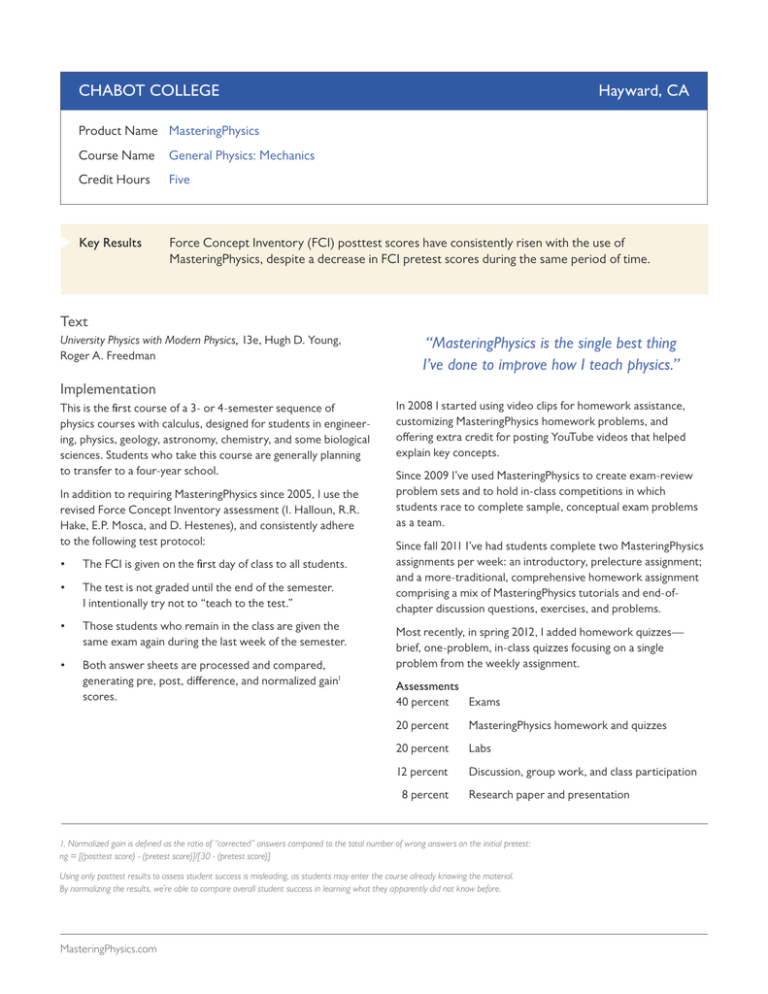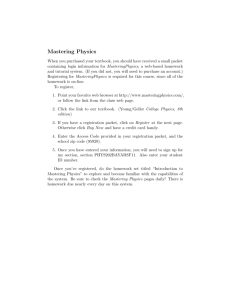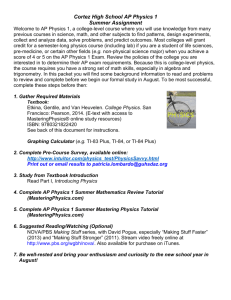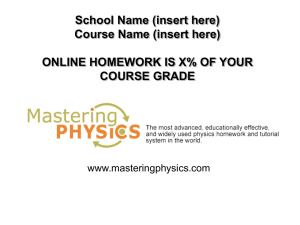CHABOT COLLEGE Hayward, CA “MasteringPhysics is the single
advertisement

CHABOT COLLEGE Hayward, CA Product Name MasteringPhysics Course Name General Physics: Mechanics t Credit Hours Five Key Results Force Concept Inventory (FCI) posttest scores have consistently risen with the use of MasteringPhysics, despite a decrease in FCI pretest scores during the same period of time. Text University Physics with Modern Physics, 13e, Hugh D. Young, Roger A. Freedman “MasteringPhysics is the single best thing I’ve done to improve how I teach physics.” Implementation This is the first course of a 3- or 4-semester sequence of physics courses with calculus, designed for students in engineering, physics, geology, astronomy, chemistry, and some biological sciences. Students who take this course are generally planning to transfer to a four-year school. In addition to requiring MasteringPhysics since 2005, I use the revised Force Concept Inventory assessment (I. Halloun, R.R. Hake, E.P. Mosca, and D. Hestenes), and consistently adhere to the following test protocol: • The FCI is given on the first day of class to all students. • The test is not graded until the end of the semester. I intentionally try not to “teach to the test.” • Those students who remain in the class are given the same exam again during the last week of the semester. • Both answer sheets are processed and compared, generating pre, post, difference, and normalized gain1 scores. In 2008 I started using video clips for homework assistance, customizing MasteringPhysics homework problems, and offering extra credit for posting YouTube videos that helped explain key concepts. Since 2009 I’ve used MasteringPhysics to create exam-review problem sets and to hold in-class competitions in which students race to complete sample, conceptual exam problems as a team. Since fall 2011 I’ve had students complete two MasteringPhysics assignments per week: an introductory, prelecture assignment; and a more-traditional, comprehensive homework assignment comprising a mix of MasteringPhysics tutorials and end-ofchapter discussion questions, exercises, and problems. Most recently, in spring 2012, I added homework quizzes— brief, one-problem, in-class quizzes focusing on a single problem from the weekly assignment. Assessments 40 percent Exams 20 percent MasteringPhysics homework and quizzes 20 percent Labs 12 percent Discussion, group work, and class participation 8 percent Research paper and presentation 1. Normalized gain is defined as the ratio of “corrected” answers compared to the total number of wrong answers on the initial pretest: ng = [(posttest score) - (pretest score)]/[30 - (pretest score)] Using only posttest results to assess student success is misleading, as students may enter the course already knowing the material. By normalizing the results, we’re able to compare overall student success in learning what they apparently did not know before. MasteringPhysics.com MasteringPhysics: Chabot College Due to the small number of courses taught during the examined timeframe, and to course enrollments of only 25–50 students, significant conclusions about specific causes and effects are impossible to quantify. Additionally, the many variables involved—including types of students, textbooks, changes in labs, and changes in approaches—make it inappropriate to suggest that MasteringPhysics alone has produced the trends observed. That said, as I use the program more and more— for lecture problems, remediation, exam preparation, and collaborative group work—I repeatedly witness its very positive impact on my students. 25 FCI Score 20 15 10 5 0 S1999 F1999 F2000 F2009 w/o MP w/o MP w/o MP w/MP S2010 w/MP F2011 w/MP S2012 w/MP Students report that the immediate feedback on homework assignments helps them feel more successful. In end-of-term anonymous surveys, more than 90 percent of students surveyed indicate that the use of MasteringPhysics is “important,” “very important,” or “most important” to their success. Semester/Year Pretest The Student Experience Posttest Figure 1. FCI Pre- and Posttest Scores Results and Data Student comments include the following: During the last four terms, FCI pretest scores have been comparable, and may even be starting to trend lower. During the same period, posttest scores have consistently risen. As measured by the FCI, student understanding of basic mechanics has improved. See figure 1. • “I used hints for some problems, and that helped me solve [for] the correct answer. I really like those hints that remind us to think about the sign or asks if a certain force or variable matters in the problem.” • “The MasteringPhysics homework helped me to understand the material better and to manage my time better. I liked having more than one chance to answer a question and getting hints when I was unsure.” FCI Marginalized Gain Students using MasteringPhysics achieved larger normalized gains than did those in earlier years (see figure 2), and they also achieved larger normalized gains than those students in physics classes in which MasteringPhysics was not used as extensively (although there were many differences in approaches, as well). In addition, my second- and third-term students show much more aptitude tackling complex problems, and course completion rates are up approximately 10 percent compared to courses offered 10 years ago, in which MasteringPhysics was not used. 0.7 0.6 0.5 R = 0.8913 0.4 0.3 Conclusion I’ve used MasteringPhysics for more than six years and I’m convinced that it has significantly improved both my teaching and my students’ learning. I now know what my students know, what they don’t know, and why. Time that was once spent grading homework now is used for improving my lectures and labs. Plus, I’ve seen better questions asked in lecture, moreactive participation in labs, and slightly better exam scores. Perhaps most important, many more students seem to feel that they have the opportunity to succeed. I believe that is a direct reflection of the outstanding pedagogy inherent in the MasteringPhysics program. 0.2 0.1 0.0 S1999 w/o MP F1999 w/o MP F2000 w/o MP F2009 w/MP S2010 w/MP F2011 w/MP S2012 w/MP Semester/Year Figure 2. FCI Pretest to Posttest Marginalized Gains Submitted by Scott Hildreth Chabot College MasteringPhysics.com



